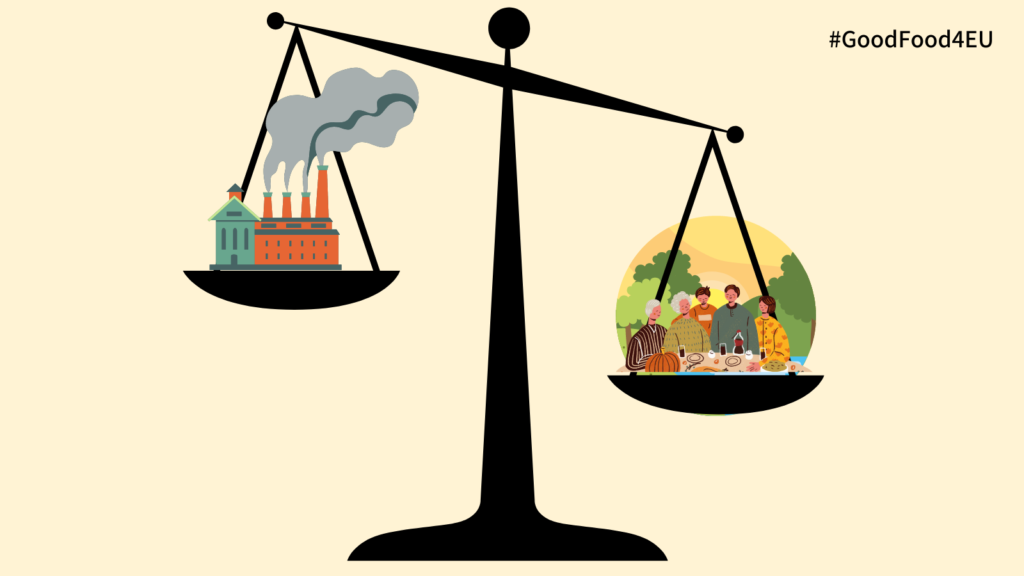
As the European Commission prepares for the launch of its proposal on the Sustainable Food Systems (SFS) Legislative Framework in late September, the EU Food Policy Coalition has published a joint report laying out clear policy recommendations for the SFS Law to ensure a meaningful transition to sustainable food systems across the European Union. This framework law is a crucial part of the Farm to Fork Strategy, which will aim to integrate sustainability into all food-related policies, with significant implications for food production, distribution and consumption in the EU. Below we republish the introduction and executive summary of this new report, while also making it available to download.
Introduction
A sustainable food system ensures everyone has easy access to healthy, environmentally sustainable, culturally appropriate and nutritious diets at all times, regardless of their socioeconomic position in society. It does so through production, distribution and consumption processes that operate within planetary boundaries, while contributing to the protection and restoration of natural resources and ecosystems, including water, soil, air, biodiversity and landscapes.
A sustainable food system also provides viable livelihoods and dignified working conditions to all workers employed in it, wherever they are, and respects and protects human rights. The animals involved in such a system enjoy the highest welfare standards. Representatives of all food system actors, at every level of governance, must be involved in the development and management of a sustainable food system.
Download Sustainable Food Systems Law – policy recommendations for a meaningful transition
But the current food system is a far cry from being sustainable, healthy or fair, and time is running out to address the pressing social and environmental crises it faces.
Today, around 38 million people in the EU face some degree of food insecurity, with the trend growing since 2015 and further accelerated by the impacts of the COVID-19 pandemic and the war in Ukraine. At the same time, European diets, characterised by excessive consumption of ultra-processed foods, animal proteins, fat, sugar and salt, are key drivers of non-communicable diseases (NCDs), including cardiovascular diseases, type 2 diabetes and some cancers. In 2019 alone, the EU lost over 814,000 citizens to premature deaths associated with an unhealthy diet.
Current food systems are impinging heavily on planetary boundaries, globally causing around one third of all greenhouse gas (GHG) emissions, depleting biodiversity on land and at sea and driving rapid deforestation in the Global South. Our current food system is rooted in the excessive use of chemical inputs, extractive land management and monocropping, industrialised livestock rearing highly dependent on feed imports, as well as widespread food loss and waste, all of which have devastating impacts on climate, biodiversity, soils, air, water and nature. Agroecological alternatives exist, but the context of heavy industrialisation makes it difficult for them to thrive.
Power imbalances and corporate capture skew the food system towards a profit-driven model with little regard for the health, well-being and dignity of the workers employed in it, let alone the animals involved. Globalised supply chains, along with the trade agreements that underpin them, amplify these failings. This results in human rights violations, dire working conditions and economically unsustainable livelihoods. Seasonal workers and small scale farmers are among the worst affected. These same actors are also those who have the least access to, and representation in, policymaking.
The multiple interconnected crises we are currently facing – from the triple planetary crises of climate change, biodiversity loss and pollution, to the spread of diet-related diseases, premature mortality and the cost-of-living crisis – have further emphasised our food system’s failings. Lower-income households and small-holder food producers have been the worst hit by supply chain disruptions and inflationary increases in food prices, whereas large industry players have seen their profits rise steadily.
The food system we have built over the past 60 years in the EU is clearly not sustainable and requires urgent systemic transformation. The transition can only be initiated through a holistic policymaking approach that addresses every one of the shortcomings identified above and considers their many interconnections.
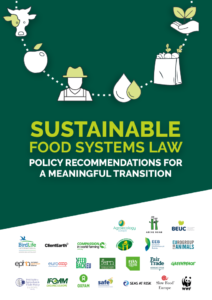
The Common Agricultural Policy (CAP), one of the EU’s main food-related policies, has historically focused on increasing productivity and ensuring cheap raw materials for the food industry. This has driven the EU food system to overproduction, overconsumption, waste, dumping in third countries, and the exploitation of natural resources to the brink of ecosystem collapse. At the same time, the Common Fisheries Policy (CFP) has failed to reach its objectives of sufficiently reducing the overexploitation of fish populations, contributing to the EU’s environmental ambitions, and fostering a just transition to low-impact fisheries. Other social and environmental imperatives for the food system have been addressed in separate policy areas, little coordination or consistency, resulting in extreme policy incoherence, conflicting objectives and gaping loopholes.
The systemic approach outlined in the Farm to Fork Strategy represents a first promising move towards addressing these incoherences, and the SFS Law must be the first legislative medium concretely translating those cross-cutting commitments into EU law. We need a comprehensive and consistent policy approach bringing all food system sectors and actors, from production to consumption, within a coherent framework tracing the path to sustainability for the whole EU food system.
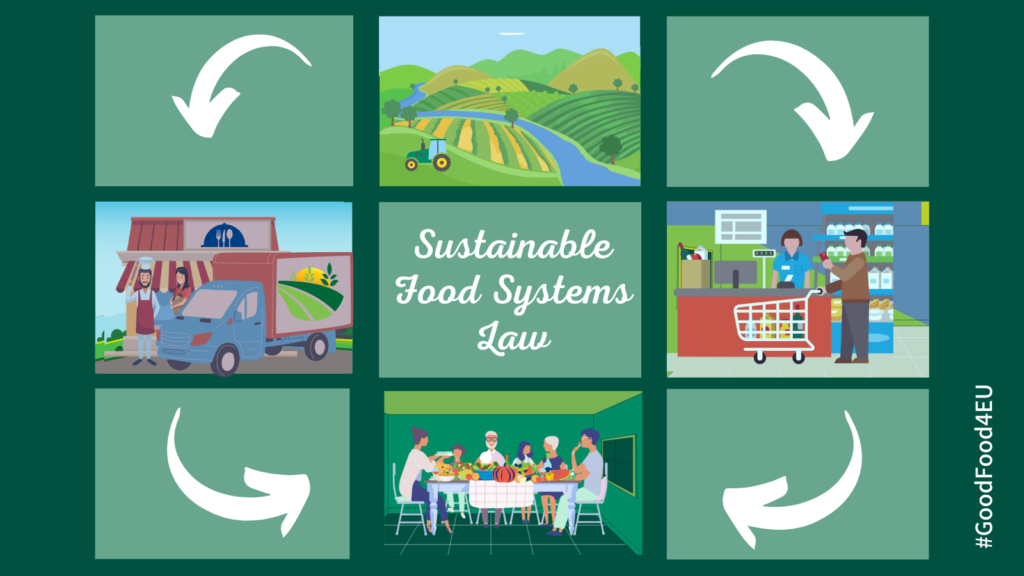
The objectives and way forward laid out in the Farm to Fork Strategy have been under attack since its publication. The agriculture and agro-chemical lobbies, as well as politicians with a vested interest in maintaining the status quo, have taken advantage of the current crises to undermine the EU’s environmental ambitions, pushing for ever-greater production through the increased use of harmful agricultural inputs, supposedly in the name of food security. But with food production in Europe already being hampered by an increasingly extreme and unpredictable climate, the resultant degradation of soils and ecosystems from agricultural inputs will only threaten food security more. Only by ensuring environmental and social sustainability in our food systems can we future-proof them against climate and geopolitical shocks and ensure that everyone has access to food that is nutritious and culturally acceptable now and in the future.
The only way in which we will be able to produce enough healthy and nutritious food for everyone in the long term, is through a transition to sustainable food systems. That depends on a shift to organic farming, agroecology and low-impact fisheries, and sustainable diets rooted in local, fresh and nutritious food with a clear reduction in the consumption of industrially-produced animal2 products.
This report presents some of the measures that the EU’s SFS framework legislation should enshrine in order to encourage a transition to sustainable food systems across the EU and its Member States. The report presents four key building blocks: adopting a food systems approach, reforming governance, reshaping food environments, and ensuring accountability and fairness throughout food value chains. Each comprises an overview of the issues at hand and specific recommendations.
The EU’s Sustainable Food Systems (SFS) framework legislation is a unique opportunity to initiate a historic shift towards a sustainable European food system which ultimately also delivers on health and social fairness. This report presents four priorities and associated policy recommendations that the EU’s SFS framework legislation should enshrine to build a comprehensive and consistent policy approach bringing together all food system sectors and actors, from production to consumption.
Executive Summary
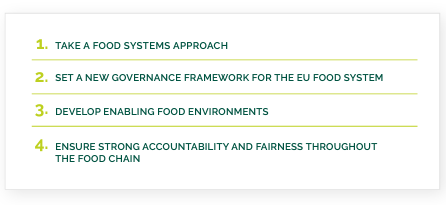
Priority 1: Take a food systems approach
- The overarching objective of the SFS Law must be that enable an ambitious, just and systemic transition to environmentally-sound, fair and healthy food systems that operate within planetary boundaries.
- To achieve such a transition, the SFS Law must first of all be rooted in the recognition of the food system’s complexity and of the subsequent need to evaluate food sustainability by considering the wider system from which food products result and within which they are processed, transported, sold, consumed, and disposed of.
- This systemic approach should be reflected in the definitions, methodologies and indicators designed to monitor and measure progress towards food system sustainability.
Priority 2: Set a new governance framework for the EU food system
- The law must take the form of a framework legislation laying down the definitions, guiding principles and overarching objectives for the EU food system binding all food- related laws and policies, particularly the Common Agricultural and Fisheries Policies (CAP and CFP).
- The law should define competence sharing among EU institutions and support food democracy to address institutional power concentration in the food sector. As such, the SFS law should: ○ spread policy making competences and responsibilities across all relevant DGs as well as within different Council formations and Parliament Committees;
○ foresee the creation of a European Food Council and encourage the creation of Food Policy Councils at different levels of governance;
○ guarantee funding lines to encourage social innovation and experimentation at the local level. - The law should set a legal framework for National Sustainable Food Plans through which national and local authorities would set out how they will deliver on the objectives of the SFS Law. It should include a set of recommendations for Member States for the effective achievement of overarching objectives through measures of national competence: revision of national dietary guidelines, minimum requirements applying to the food environment, and measures supporting the accessibility and affordability of food.
Priority 3: Develop enabling food environments
- Addressing the consumption side is key to transitioning to truly sustainable food systems. But the dominant policy approaches to shifting dietary patterns have so far been based on the so-called ‘consumer responsibility narrative’. Such an approach relies predominantly on improving the information available about food products, and expecting consumer behaviour to change accordingly.
- Depending on responsible consumer choices to change large-scale dietary trends is both ineffective and morally questionable. Food consumption choices are determined by a much more complex combination of factors and influences – the food environment1.
- Food environments today are disproportionately shaped by the profit-driven interests of private actors, particularly in the middle of the food supply chain (retailers, advertisers, processors, and the food service sector). This segment of the chain has been characterised by increasing power concentration over the past three decades.
- Initiating a just dietary transition requires a comprehensive food environments approach to food-related policymaking. The SFS Law should introduce strong EU level measures on public and private procurement and marketing, which are key levers of change.
- As many key competences relating to consumption-side policies fall under national competence, the SFS Law should require action at national and local level through National Sustainable Food Plans.
-
Priority 4: Ensure strong accountability and fairness throughout the food chain
- In the current food system, food is generally treated as a commodity instead of a common good, with private interests consequently having a disproportionate influence on determining what is produced and sold on the EU market.
- The concentration of power in agrifood value chains and unsustainable trade policies also hinder the transition to sustainable models of food production in the EU, as farmers get squeezed by bigger players and are forced into a price-taking position.
- The SFS Law should lay the bases to address the social and environmental harm caused by industrialised food production, particularly by:
o establishing a clear regime of corporate responsibility for actors in the middle of the food chain;
o bringing the EU’s food trade policy within a socially and environmentally safe operating space;
o providing strong enforcement mechanisms.
More
“CAP is an Aberration in terms of Climate & Environmental Impact of Ag”




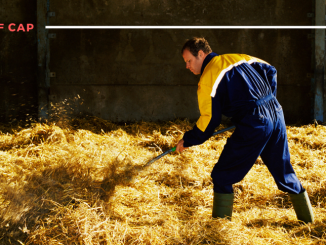
1 Trackback / Pingback
Comments are closed.